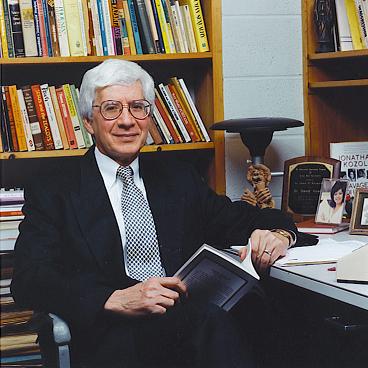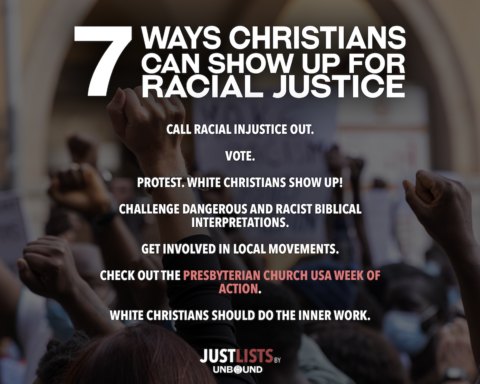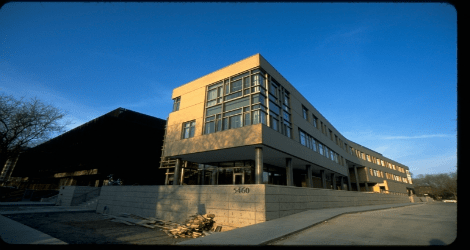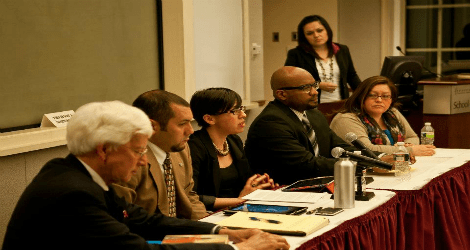Princeton Theological Seminary
Creating a Faculty and Curriculum for a Transformative Seminary Education
The following is an excerpt of David Abalos’ presentation at Princeton Theological Seminary. See the entire presentation here.
By David T. Abalos
Four Kinds of Education and Seminarian Development
The development of the young seminarian is stunted and arrested when we prepare them to become unquestioning followers of the values of their family, church, and society practicing the story of uncritical loyalty. They are educated to avoid conflict and change and to emphasize continuity and cooperation with authority figures like their parents, pastors and seminary teachers and to stress security. Everything is seen as the result of God’s will.
Young seminary students who are educated and socialized to be aggressive, individualistic, and competitive above all have their development slanted towards domination over others. Their lord is a capitalistic god who inspires them to equate the attainment of power with salvation.
The most debilitating kind of training for seminary students is to prepare them to cripple others in the story of tribalism. Such students are socialized to believe on the basis of race, class, gender, sexual orientation, national origin, religion, or skin color that they are superior to others.
The great task is the education and development of seminarians to prepare themselves together with others to create a fundamentally more compassionate and just society. Their focus will be on changing and conflicting with people and structures in the society that have institutionalized the inferiority of others and to cooperate with others in achieving the continuity of the best principles of our churches and society, equality and justice based on love. Such development means becoming co-creators with the God of transformation in the ongoing task of continuing creation.
A Search for Identity
I am an alumnus of Princeton Seminary who received his Ph.D. in 1972. I was an unusual student since I was a Roman Catholic teaching Religious Studies at a Catholic University. During my four years at PTS I received an excellent education. I made full use of the connection between the Seminary and the University. Because of this wonderful relationship I was able to take courses in Politics, Sociology and Anthropology at the University in preparation for my Comps.
This academic pursuit arose out of my search for identity. As a son of Mexican parents I felt a need to know my own heritage and to make it available to others through scholarship and teaching. I was invited to teach a course at Yale on Latinos in the United States for four successive Spring semesters. At Princeton I was asked to create a course for the Politics Department in 1981 that became a permanent offering of the Department: Latino Politics in the United States.
Recently I experienced a similar wonderful response to our Latino community here at Princeton Seminary. Two years ago I had the good fortune almost by accident to be present at several meetings and functions sponsored by the Hispanic Theological Initiative and more recently this year’s HTCI conference. And yet in spite of this wonderful initiative, if one looks at the Seminary curriculum, the faculty, administration, and Board of Trustees, they are devoid of the Latino presence.
And yet good theology is authentic only because it is a theology in context, that is, it reflects the reality of the Church as a cross section of the community, which is the Body of Christ. So I ask is it possible for Princeton Seminary to teach the Word of God, that is, share the Spirit of Truth, in its curriculum and structural makeup without including the many millions of Latina women and men in this country? Many, especially the undocumented live in a diaspora of poverty, invisibility and vulnerability. As one of our great Latin American theologians, Juan Luis Segundo, has said: “Any sacramental activity that is not related to the needs of the people is irrelevant”.
How to Build a Program around a Distinguished Professor
The template for faculty hiring and its impact on the curriculum that can transform the educational environment was set by Professor Sang Hyun Lee, who will retire from teaching this June. Prof. Lee came to PTS and set up an enduring legacy for Asian Americans. He served as director of the Seminary’s program for Asian American Theology and Ministry. Prof. Lee taught courses on Jonathan Edwards as well as Asia American Theology. In addition, PTS established “a biennial lectureship, The Sang Hyun Lee Lecture on Asian American Theology and Ministry in order to preserve space for the Asian American voices of the present, to empower the Asian American ministers and theological scholars of the future….” (Inspire, “Turning 200,” Fall 2011/Winter 2012, Volume 16, Number 1).
We applaud what PTS did for the Asian American community. As Latina women and Latino men, our community can be greatly enhanced when our universities and seminaries recognize the imperative of demographics as a moral and political imperative to empower the fastest growing community of color in the nation. What PTS did for the Asian American community it can also do for us and other communities of color. Surely there are scholars in our communities around whom other ethnic programs can be established. We wish in no way to enter into competition with other communities of color but to form a coalition with them to create a curriculum and faculty, administrators, and Board of Trustees that truly reflect the reality of America.
Dr. Abalos proceeds to identify and exegete the cultural stories of Latin@ students, stories that, he says, need to guide and be integrated into the curriculum. Among these stories is his powerful examination of the dangers of assimilation. He writes, “Assimilation is never neutral. It does great violence to our community. Assimilation is self-wounding, self-denial, self-hatred, amputation, trauma… and amnesia which is familial.” Unbound is proud to provide a PDF of Dr. Abalos’ entire statement here.
_________________
David T. Abalos, Ph.D, is a graduate of Princeton Theological Seminary and author of Latinos in the United States: The Sacred and the Political. He has taught Latino politics at Princeton University and Yale University.





Unbound Social